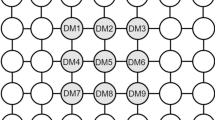Abstract
Classical models of decision-making do not incorporate for the role of influence and honesty that affects the process. This paper develops on the theory of influence in social network analysis. We study the role of influence and honesty of individual experts on collective outcomes. It is assumed that experts have the tendency to improve their initial predilection for an alternative, over the rest, if they interact with one another. It is suggested that this revised predilection may not be proposed with complete honesty by the expert. Degree of honesty is computed from the preference relation provided by the experts. This measure is dependent on average fuzziness in the relation and its disparity from an additive reciprocal relation. Moreover, an algorithm is introduced to cater for incompleteness in the adjacency matrix of interpersonal influences. This is done by analysing the information on how the expert has influenced others and how others have influenced the expert.


Similar content being viewed by others
References
Beg I, Rahid T (2017) Modelling uncertainties in multi-criteria decision making using distance measure and TOPSIS for hesitant fuzzy sets. J Artif Intell Soft Comput Res 7(2):103–109
Benferhat S, Bouraoui Z, Chaudhry H, Rahim MS, Tabia K, Telli A (2016) Characterizing non-defeated repairs in inconsistent lightweight ontologies. In: 2016 12th international conference on signal-image technology & internet-based systems (SITIS). IEEE, pp 282–287
Bezdek J, Bonnie S, Spillman R (1978) A fuzzy relation space for group decision theory. Fuzzy Sets Syst 1(4):255–268
Capuano N, Chiclana F, Fujita H, Viedma EH, Loia V (2018) Fuzzy group decision making with incomplete information guided by social influence. IEEE Trans Fuzzy Syst 26(3):1704–1718
Chaudhry H, Karim T, Abdul Rahim S, BenFerhat S (2017). Automatic annotation of traditional dance data using motion features. In: 2017 international conference on digital arts, media and technology (ICDAMT). IEEE, pp 254–258
Chiclana F, Herrera-Viedma E, Francisco H, Alonso S (2007) Some induced ordered weighted averaging operators and their use for solving group decision-making problems based on fuzzy preference relations. Eur J Oper Res 182(1):383–399
DeGroot MH (1974) Reaching a consensus. J Am Stat Assoc 69:118–121
Friedkin NE, Johnsen EC (1999) Social influence networks and opinion change. Adv Group Process 16(1):1–29
Giles R (1976) Łukasiewicz logic and fuzzy set theory. Int J Man Mach Stud 8(3):313–327
Hannu N (1981) Approaches to collective decision making with fuzzy preference relations. Fuzzy Sets Syst 6(3):249–259
Herrera-Viedma E, Herrera F, Francisco C, Luque M (2004) Some issues on consistency of fuzzy preference relations. Eur J Oper Res 154(1):98–109
John S, Carrington PJ (2011) The SAGE handbook of social network analysis. SAGE Publications, Thousand Oaks
Khalid A, Beg I (2019) Soft pedal and influence-based decision modelling. Int J Fuzzy Syst. https://doi.org/10.1007/s40815-018-00600-y
Mitchell HB, Estrakh DD (1997) A modified OWA operator and its use in lossless DPCM image compression. Int J Uncertain Fuzziness Knowl Based Syst 5(04):429–436
Pérez LG, Mata F, Chiclana F, Kou G, Herrera-Viedma E (2016) Modelling influence in group decision making. Soft Comput 20(4):1653–1665
Qian L, Liao X, Liu J (2017) A social ties-based approach for group decision-making problems with incomplete additive preference relations. Knowl-Based Syst 119:68–86
Siegfried W (1983) A general concept of fuzzy connectives, negations and implications based on t-norms and t-conorms. Fuzzy Sets Syst 11(1–3):115–134
Stanley W, Faust K (1994) Social network analysis: methods and applications, 8. Cambridge University Press, Cambridge
Tanino T (1984) Fuzzy preference orderings in group decision making. Fuzzy Sets Syst 12(2):117–131
Yager RR (1983) Quantifiers in the formulation of multiple objective decision functions. Inf Sci 31(2):107–139
Yager RR (1988) On ordered weighted averaging aggregation operators in multicriteria decisionmaking. IEEE Trans Syst Man Cybernet 18(1):183–190
Yager RR (2003) Induced aggregation operators. Fuzzy Sets Syst 137(1):59–69
Yager RR, Dimitar FP (1999) Induced ordered weighted averaging operators. IEEE Trans Syst Man Cybernet Part B (Cybernet) 29(2):141–150
Zadeh LA (1983) A computational approach to fuzzy quantifiers in natural languages. Comput Math Appl 9(1):149–184
Author information
Authors and Affiliations
Corresponding author
Ethics declarations
Conflict of interest
The authors declare that they have no conflict of interest.
Ethical approval
This article does not contain any studies with human participants or animals performed by any of the authors.
Informed consent
Research does not directly involve human participants. Informed consent is ensured.
Additional information
Communicated by V. Loia.
Publisher’s Note
Springer Nature remains neutral with regard to jurisdictional claims in published maps and institutional affiliations.
Rights and permissions
About this article
Cite this article
Khalid, A., Beg, I. Role of honesty and confined interpersonal influence in modelling predilections. Soft Comput 24, 1497–1509 (2020). https://doi.org/10.1007/s00500-019-03981-w
Published:
Issue Date:
DOI: https://doi.org/10.1007/s00500-019-03981-w




